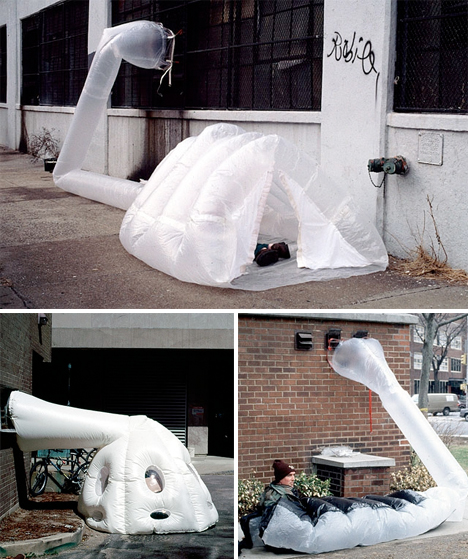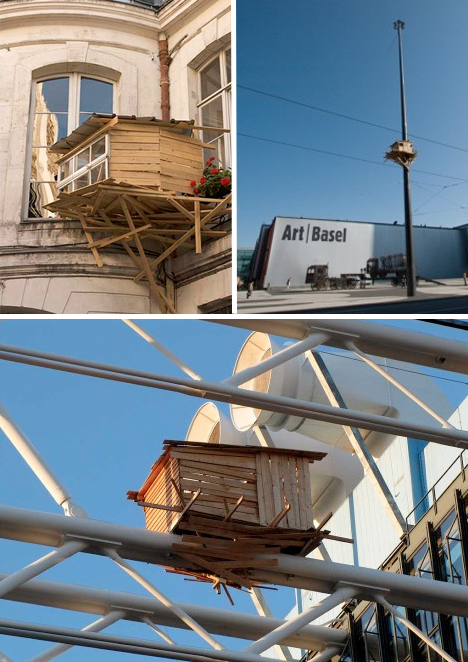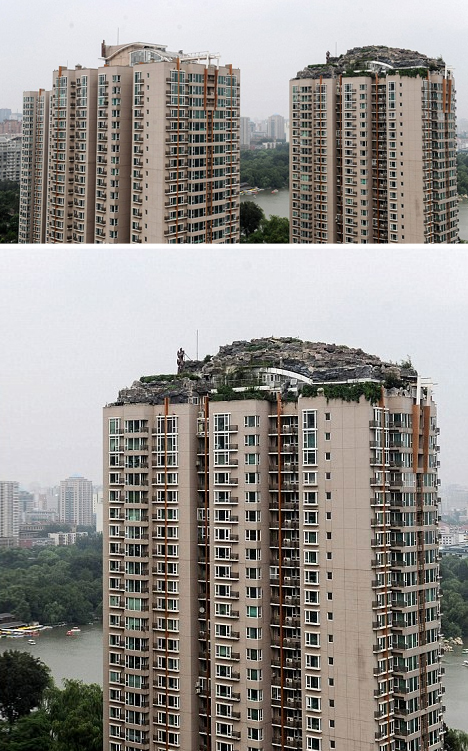[ By Steph in Architecture & Cities & Urbanism. ]

These parasitic buildings commandeer wasted urban space, often siphoning utilities from their host buildings. Some are additions that make no attempt to blend into the original structures, some are serious solutions for making the most of existing space, and others make artistic statements on fringe society and sustainable growth, but all illustrate that there are still many corners and crevices of our cities that could be put to use.
ParaSITE Inflatable Shelters

Michael Rakowitz creates inflatable ‘paraSITE shelters’ for the homeless, often specifically designed to suit individual needs, which narrowly fit within the definitions of legal temporary structures since they’re not much larger than a sleeping bag. They’re often made on a budget of less than five dollars using trash bags, ziploc bags and clear waterproof packing tape, and attached to the ventilation systems of adjacent buildings. One man, for example, requested as many windows as possible, because “homeless people don’t have privacy issues, but they do have security issues. We want to see potential attackers, we want to be visible to the public.”
Urban Tree Huts by Tadashi Kawamata

Tadashi Kawamata’s rustic pine tree houses are normally found where you would expect them – in trees (though sometimes in unexpected places, like New York City’s Madison Square Park.) But sometimes, they’re attached like man-made bird nest to urban locations, like lamp posts, bridge trusses, scaffolding and luxury apartment buildings.
Stone Villa on Top of a Chinese Condo Tower

An eccentric Chinese man spent six years creating his very own mountain paradise – on top of a Beijing high-rise – illegally. It has everything you’d expect from a luxury residence including boulders, trees, gardens, winding paths, viewing platforms and pools, hauled up through the building to adorn his private penthouse retreat. Unsurprisingly, other residents in the 26-story building have complained about construction noise and even flooding. The Chinese government has ordered the professor to remove the 800-square-meter villa.
Prefab Parasite

Empty vertical surfaces could become the basis of parasitic living spaces made out of prefab panels. The dwellings could be affixed to any wall or pylon strong enough to support them using a mountain plate. This particular design, by Lara Calder Architects, features paneling made of compressed bamboo and recycled paper. It measures about 400 square feet, and features an open-air rooftop terrace. A combination staircase and service shaft connecting the home to power, sewer and water is the only part touching the ground.
Excrescent Utopia: Parasite Architecture for the Homeless

British architecture graduate Milo Ayden De Luca envisions parasitic structures for the homeless that could cling to the sides of lamp posts . Made of cheap and readily available materials like pulleys, nylon and rope lines, the structures are translucent and nearly weightless.
Next Page:
Parasitic Architecture 15 Precariously Perched Structures




[ By Steph in Architecture & Cities & Urbanism. ]
[ WebUrbanist | Archives | Galleries | Privacy | TOS ]
![]()





You must be logged in to post a comment.